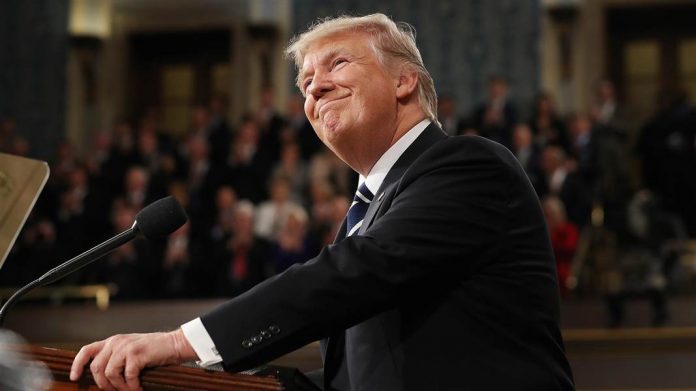
WASHINGTON – The first court action on President Trump’s revised travel ban could come as soon as Tuesday night, lawyers for immigrants and refugees say, after the federal judge in Seattle who blocked Trump’s first ban receives legal filings about the executive order that is slated to take effect Thursday.
U.S. District Judge James L. Robart has ordered the Trump administration’s lawyers to submit a brief by 4:30 p.m. Pacific time (7:30 p.m. EST) in a lawsuit filed by the state of Washington against the president’s revised order, which will suspend the U.S. refugee program and temporarily bar the issuance of new visas to citizens of six-Muslim majority countries.
“Time is of the essence,” said Peter Lavallee, spokesman for the Washington state Attorney General’s office, which filed the lawsuit with the support of several other states. “We’ll just wait to see what happens.”
Other court hearings are scheduled in similar cases in Hawaii and in federal court in Greenbelt, Maryland, on Wednesday.
“We believe that the injunction issued in Seattle should remain in force and that the government has not provided a reason why the injunction should be vacated,” said Lee Gelernt, a lawyer with the American Civil Liberties Union, which is representing a refugee-rights organization in a similar case in Maryland. “If the Seattle injunction is kept in place nationwide, then there may be less urgency for an injunction from other courts.”
In February, Robart suspended Trump’s first travel ban, a broad executive order issued Jan. 27 that suspended the refugee program, halted travel of citizens of seven Muslim majority countries, including those who already had been issued visas, and triggered chaos and protests at airports worldwide.
When Robart froze Trump’s original executive order, the president criticized him on Twitter, declaring him a “so-called judge” and deeming his ruling “ridiculous.” But a three-judge panel with the U.S. Court of Appeals for the 9th Circuit unanimously upheld the judge’s decision and kept Trump’s travel ban on hold.
Instead of appealing, Trump issued a revised order on March 6. The Justice Department has said the new measure supersedes the restraining order imposed on the initial ban, and will be enforced starting Thursday. On Monday, the state of Washington asked the court to stop the administration from doing so.
“Injunctions are not suggestions,” lawyers for the state of Washington wrote. “When a court enjoins a defendant from enforcing policies, the defendant cannot evade the injunction by announcing that it will continue only some of the illegal policies.”
The new order reduces the list of affected countries from seven to six – removing Iraq, while keeping Iran, Sudan, Somalia, Libya, Yemen and Syria. The order blocks the issuance of new visas for 90 days – exempting those with green cards or visas in hand – and spells out a robust list of people who could apply for exemptions.
The order maintains a 120-day freeze on the refugee program, and slashed the number of refugees to be admitted to the United States this fiscal year from 110,000 to 50,000.
Washington attorney general Bob Ferguson acknowledged that the administration had “capitulated on numerous key provisions that we contested in court,” but he and several other states urged Robart to freeze the new order as well. In a court filing, Ferguson pointed to comments by Trump senior policy adviser Stephen Miller that the new executive order would address “very technical issues” and achieve “the same basic policy outcome.”
The new order undoubtedly reduces the number of people with standing to sue, but civil liberties advocates and others say it is still legally problematic. Washington and other states have said the imposes economic harm on them, and that, like the first ban, it is unconstitutional because it is intended to discriminate against Muslims.
The administration has disputed that characterization and said the order is necessary for national security. The administration also argues that there is no need to freeze the order while people challenge it in court because it does “no imminent harm.”
“No visa is revoked. No lawful permanent resident traveling abroad is barred from returning,” the Justice Department said in a brief filed Monday in the Maryland lawsuit. “Nobody lawfully in the United States loses any prior ability to leave the country to travel and later return. Plaintiffs, in short, identify no cataclysm that will befall them on March 16 or any time soon thereafter.”
But refugee resettlement organizations say Trump’s executive orders are putting families from war-ravaged nations at risk.
Kay Bellor, vice president for programs at Lutheran Immigration and Refugee Service, the second-largest refugee-resettlement agency in the United States, said “the biggest hit for refugees” is that the president has sharply curtailed the number of refugees fleeing war and other dangers from coming to America.
As of March 10, she said, 37,658 refugees have arrived in the United States this fiscal year. If Trump’s ban remains in effect, little more than 12,000 more will be allowed in this year. She said that would leave 60,000 refugees who had hoped to come to this country with no place to go.
“Essentially the door is slamming shut,” Bellow said. “Who knows what cues other countries will take if we just shut the door?”
(c) 2017, The Washington Post · Maria Sacchetti, Matt Zapotosky

